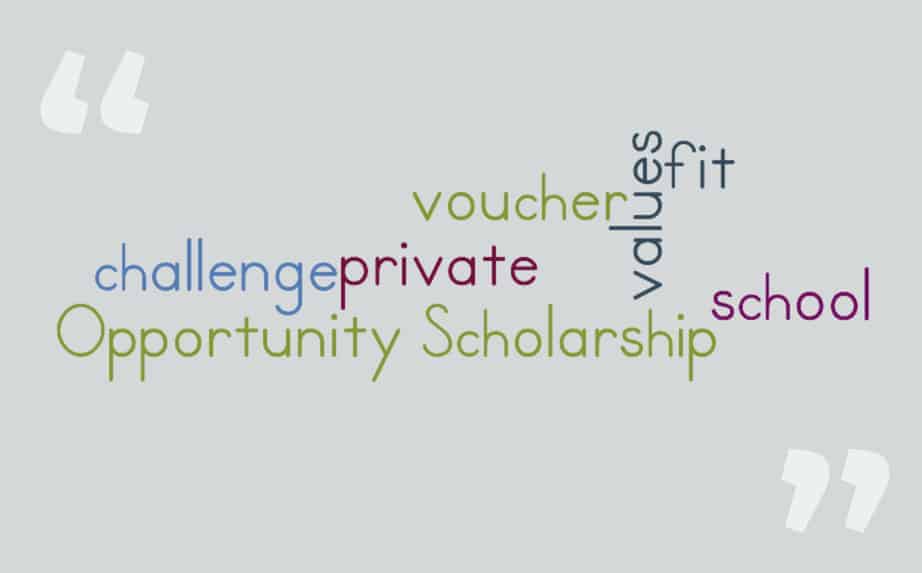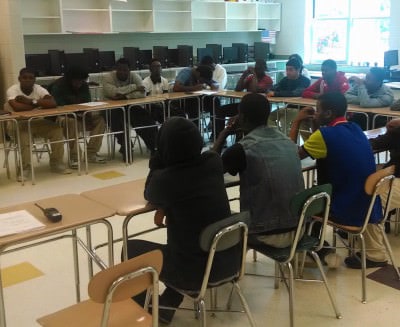

Editor’s Note: This week, January 25-31, is National School Choice Week. It is a good opportunity to think about school choice as it relates to having access to a high quality education in our public schools. For background information on school choice, please see Education Week’s Issues A-Z: Choice and the U.S. Department of Education’s definitions of school choices for parents. EdNC will be presenting a wide range of perspectives on school choice throughout the week and inviting you to participate in this conversation.
North Carolina’s publicly-funded school choice options experienced a historic expansion in summer 2013 when the North Carolina General Assembly included funding for a school voucher program in its appropriations bill (NC Session Law 2013-360; slight modifications were included the following year in NC Session Law 2014-100).
The program—called the Opportunity Scholarship—was available to lower-income families for the first time for the 2014-15 school year and provided them with up to $4,200 to use toward tuition at a large number of participating private schools in North Carolina. The program is scheduled to expand for the 2015-16 school year to include families with higher incomes.
Most of the interest in the program—both positive and negative—has been focused on its constitutionality (which has been challenged in state court, but as of this writing the Supreme Court has not delivered a decision, and the program is scheduled to remain in operation for the 2015-16 school year), as well as on whether these scholarships provide academic benefits for participating students.
Possibly as important, however, is what we can learn from program participants about why they pursued the scholarship and a private school education for their children in the first place. No matter where one stands personally on the issue of vouchers, there may be great value in understanding why, when given the opportunity, some parents opt for a private school education—even one that may cost them more than the voucher can cover—over their local free public school options—both traditional and charter.
As the first year of the Opportunity Scholarship opened, I decided to ask Opportunity Scholarship parents why they chose to enroll their children in private school. This research has only just begun, so there are not yet any clear-cut findings, but National School Choice Week seemed an appropriate time to share some of the early themes that are beginning to emerge from what parents have shared so far.
Finding the right fit for their children
Across all of the interviews so far, no theme has emerged more strongly than the importance to parents of finding a school in which their children feel connected and believe that they fit in. Many of the parents interviewed said that they did not have a particular private school in mind when they applied for the voucher; instead, they visited several schools in their area to try to find one that would work best for their children:
- “We visited more than one [school] and met with the administrators of each school, the principals and the financial staff.”
- “We went to a couple of private schools and felt that this was hands-down the best decision for our family.”
Some even came to realize during their search just how different their private school options were:
- “The reason we did not go with [School A] was because . . . they are not accredited . . . up to high school.”
- “[At the school we chose,] certain things are not tolerated and you will get the boot out of school. It does not matter how good of a basketball or football player you are . . . [but at] other private schools, they care about the win and things like that. It does not matter here; it is school: Your grades come first and certain things are not tolerated.”
One parent acknowledged that his public school option was good, but added that he did not think that it was good enough:
- “I wanted more out of [my son’s] education. I did not want it to be easy. I did not want to sit in a parent-teacher conference and hear that he is doing great in everything, and that I should just keep doing what I am doing. I wanted him to struggle, I wanted him to experience difficult material and be challenged. . . . The [public] school here [in our town] is average, it is a good school, it is fine, but it was not the right school for him.”
A principal at one of the participating schools shared that he counsels prospective parents to find the right fit, even if that fit is public school.
Reflecting their values
Almost all of the parents interviewed so far have indicated that, even without the Opportunity Scholarship, they would not have chosen to send their children to public school. Some had been homeschooling and would have continued to do so, while others said that, without the voucher, they would have taken their children out of the public schools in which they were enrolled and opted for homeschooling.
- “[W]e were going to homeschool her because . . . we are a conservative family that knows that the public school is not a place for our children. . . . [W]e would have pulled her out and homeschooled her through high school. Because of the scholarship, she has been able to . . . be around other . . . girls that we are finding are like-minded.”
- “The options were homeschool or scholarship. It was as simple as that, because public school from middle school up is out of the question, it just does not happen [for] any of our children.”
- “We would have homeschooled. We have homeschooled our other ones, so we would have just kept right on with homeschooling.”
Perceiving public school constraints
Some of the parents interviewed felt that some of the things they did not like about public school were things that public schools are not in a position to control:
- “A lot of it is the parents. The child can act out, and they [teachers] just call the parents. Then the parents come in and fuss at them. The reason why the child acts that way is because of the parents. There is nothing [school] can do about it.”
- “There was a lack of communication . . . as far as not being able to get in contact with the teachers by e-mail or picking up the phone, which I understand, because they are so busy and there are so many kids in the classroom.”
Feeling that public school is not free
Finally, a few parents believed that their public schools were not really cost-free for them, primarily because of those schools’ budgetary constraints:
- “The Opportunity Scholarship has covered our tuition but there are other costs. There is some added stuff each month, but public school has the same thing, if not more.”
- “In the public school, my kids could not bring their books home. The teacher needs copy paper. . . . You have $300 to $400 in school supplies for each of your kids.”
As noted above, the study for which these interviews were held is only in the beginning stages, and the number of parents interviewed so far is too small to suggest that these themes will remain consistent statewide. These emerging themes do provide, however, an early glimpse into a decision-making process from which all schools — public and private — may be able to learn.
The interviews from which this article draws would not have been possible without the help of several volunteers, most especially a team of graduate students in Duke University’s Terry Sanford School of Public Policy.


